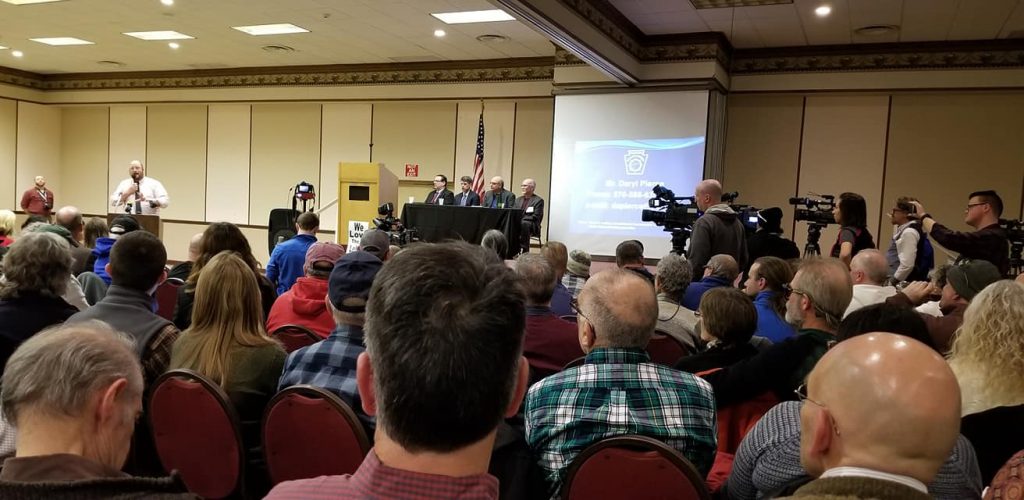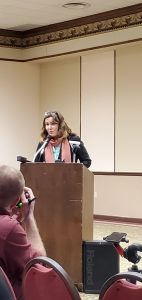
Photo credit: Lynn Shupp
For those watching and wondering about the possible threat posed by NYC and the re-evaluation of the Francis Walter Dam flow management plan…
Opinion by Amber Breiner, President of Carbon County Community Foundation
[1/10/20] The Mountain Laurel Resort was PACKED last night. I arrived an hour early to register to speak and by the time I gave my name, the list was already a dozen people long. At least 500 people showed up to voice their concerns at the Army Corp of Engineers’ meeting to announce a re-evaluation study of the flow management plan at the Francis E. Walter Dam.
For those who missed his January 7 op-ed for Lehigh Valley Live, NYC Environmental Protection Deputy Commissioner, Paul Rush, clarified once more that they are not looking to take control of the water supply, divert water for drinking for NYC, or otherwise exert undo influence in our community. Mr. Rush, who bore with grace a fair amount of disdain from the crowd, respectfully submitted that NYC is merely a stakeholder in the Delaware River Watershed, of which the Lehigh is a part. At one point, an audience member called out the elephant in the room to site NYC’s very presence and participation as the reason most people were concerned that night.
As the first private sector speaker, Ken Powley set the tone for the public comment period in pointing out that the existing plan works well. It was the product of a decade’s worth of work and has been held up as a national model of public-private collaboration by America Outdoors. Ken, representing Whitewater Challengers and the Lehigh River Outfitters Association, has been involved on the Lehigh for 45 years and said, “I think the thing I am most concerned about, and proud of, is the recreation flow management plan that is in place now.”
Brandon Fogal, third generation Pocono Whitewater rafting-family member used much of his time to encourage planners to consider alternative approaches to dealing with the challenges of the fluctuating Delaware estuary salt line. He also underscored that it is early in the process and stated the importance that the community stay involved in this more than two-year-long study.

On behalf of CCCF, Amber Breiner presented a petition with 1750 signatures and voiced concerns for the community’s quality of life and economy.
On behalf of Whitewater Rafting Adventures, Steve Bretzik recapped how far we have come in one generation of progress on the Lehigh:
“We’ve heard words tonight like, ‘Trust us,’ ‘Should be protected,’ and ‘Not interested in changing,’ …but there’s no guarantees. …And unfortunately the old adage goes, we will prepare for war, but pray for peace. We want a positive outcome, we want improvements…we want the study! We want to see what we could all benefit from. But it can’t come at the cost of all we’ve worked to see now.”
He went on to echo the “no net loss” rally cry put forth by Jerry McAward of Lehighton Outdoor Center and others before him. To underscore this point, I’ll share my personal favorite of the quotes I read during my time at the podium, written by Doug Makofka of Jim Thorpe:
“Carbon and surrounding counties love their river. There has been much invested in bringing it back from when it ran black and orange with coal mine effluence. We are willing to be an eager partner in managing this watershed for the greater good; but we’re not going to destroy the gains that have been made on the Lehigh for the benefit of NYC or anyone else.”
Following the meeting, I went to talk with the Army Corps’ Steve Rochette to personally hand deliver a printed copy of the petition which 1750 or so people had signed as of the meeting and which I presented during my time at the podium. The petition stated simply that any revisions to the flow management plan must continue to prioritize the needs of the people in the immediate region of the Lehigh River.
To Mr. Rochette, I acknowledged that there have been some misunderstandings in perception of what is at stake here, but took pains to explain that our community is not crazy for being alarmed. Given that NYC is the main funder of the study, we’re within the bounds of reason to wonder what’s in it for them. Further, the manner in which the study and meeting were announced (around the holidays, with little supplemental information to help discern the motives and history behind the study) helped fan the flames of concern. Thankfully, I believe everyone left the meeting feeling cautiously optimistic and better informed. [Please see the slideshow below for background and future details on the study.]
For Paul Rush from NYC DEP, my question at the end of the night was why were there no representatives from Philadelphia or the lower Delaware at the meeting, since much of this is being done for their benefit? I asked Mr. Rush to please let the commissioner of the Philadelphia Water Department know that their absence was noted.